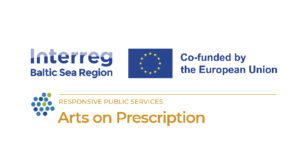Arts on Prescription animation – from concept to reality
Arts on Prescription programmes are offered by community-based organisations such as museums, adult education centres and cultural institutions. The programme runs for 8-12 weeks and takes place once or twice a week. During this time, participants have the opportunity to immerse themselves in the world of creative group activities such as shared reading or painting classes, singing, dancing, and others. The participants get a break from their daily lives, relief from stress, and build social connections.
The positive impact of the programme is expressed by participants of currently running Arts on Prescription pilot programmes in Denmark, Germany, Poland, Latvia, and Sweden:
This programme brought remarkable changes in my life. I found motivation for something new, which I’ve never tried to do on my own; a motivation to seek a permanent job, too, which I have always aspired to in my life. It’s worth trying, as it’s never too late to try. Something new, something yet untried, and something special”, Asnata Žēpere, Cēsis, Latvia.
While similar Arts on Prescription concepts have been tested in countries like Canada, Australia, the USA, and are now widely used in healthcare provision in the UK, it is still largely unknown in other European countries. There remains a lack of perception and knowledge about how to set up, organise and integrate such concepts and related art and cultural programmes into existing health care systems. New collaboration between the culture and health sector, as well as targeted guidance and training for health care practitioners, arts and culture professionals and public authorities of both sectors is needed.
To overcome these challenges, our Interreg BSR project developed an Arts on Prescription programme model that is based on state-of-the-art evidence and experience, and can be adapted to local context and public health systems. Furthermore, an upcoming online practitioners guide will include how-to-guides, fact sheets, lessons learned and audiovisual guidance for programme coordinators, culture and arts facilitators, and decision-makers on various aspects of setting up an Arts on Prescription programme. Stay tuned!
The “Arts on Prescription in the Baltic Sea Region” project is co-funded by the Interreg Baltic Sea Region Programme 2021-2027. The project helps public authorities, cultural and health institutions engage people with mental health challenges in social and non-therapy art activities to improve their mental wellbeing.
The NDPHS Secretariat is responsible for providing input and advice to all activities making use of the expertise within the Partnership, communicating and transferring project results to key stakeholders, supporting regional knowledge transfer, and taking leadership in the development of recommendations for national AoP schemes.
